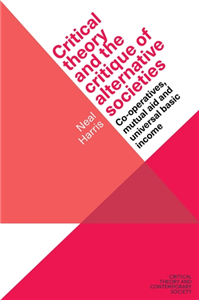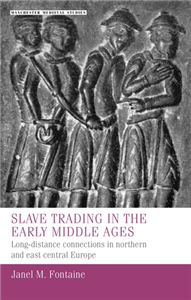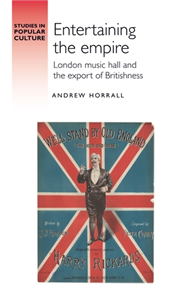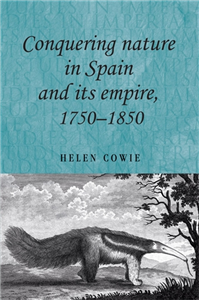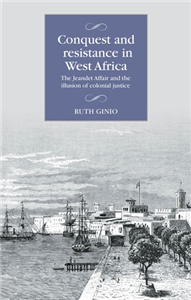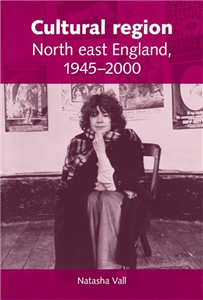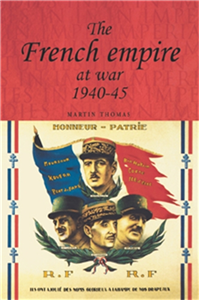Your Search Results
-
Aurora Metro Publications Ltd.
Aurora Metro is a an award-winning indie publisher established over 25 years ago in the UK. We publish fiction, non-fiction, YA fiction, drama, cookery, biography. Over 200 international authors published and over 20 works in translation.
View Rights Portal
-
Promoted ContentHumanities & Social SciencesFebruary 2017
Conquering nature in Spain and its empire, 1750–1850
by Helen Cowie, Andrew Thompson, John M. MacKenzie
This book examines the study of natural history in the Spanish empire in the years 1750-1850. During this period, Spain made strenuous efforts to survey, inventory and exploit the natural productions of her overseas possessions, orchestrating a serries of scientific expeditions and cultivating and displaying American fauna and flora in metropolitan gardens and museums. This book assesses the cultural significance of natural history, emphasising the figurative and utilitarian value with which eighteenth-century Spaniards invested natural objects, from globetrotting elephants to three-legged chickens. It considers how the creation, legitimisation and dissemination of scientific knowledge reflected broader questions of imperial power and national identity. This book will be of particular interest to scholars and students of Spanish and Latin American History, the History of Science and Imperial Culture
-
Promoted ContentHumanities & Social SciencesMarch 2021
African cities and collaborative futures
by Michael Keith, Andreza Aruska de Souza Santos
-
 Trusted Partner
Humanities & Social SciencesMarch 2021
Trusted Partner
Humanities & Social SciencesMarch 2021African cities and collaborative futures
Urban platforms and metropolitan logistics
by Michael Keith, Andreza Aruska de Souza Santos, Susan Parnell
This groundbreaking volume brings together scholars from across the globe to discuss the infrastructure, energy, housing, safety and sustainability of African cities, as seen through local narratives of residents. Drawing on a variety of fields and extensive first-hand research, the contributions offer a fresh perspective on some of the most pressing issues confronting urban Africa in the twenty-first century. At a time when the future of the region as a whole will be determined in large part by its cities, the implications of these developments are profound. With case studies from cities in Ethiopia, Kenya, Malawi, Niger, Nigeria, South Africa and Tanzania, this volume explores how the rapid growth of African cities is reconfiguring the relationship between urban social life and its built forms. While the most visible transformations in cities today can be seen as infrastructural, these manifestations are cultural as well as material, reflecting the different ways in which the city is rationalised, economised and governed. How can we 'see like a city' in twenty-first-century Africa, understanding the urban present to shape its future? This is the central question posed throughout this volume, with a practical focus on how academics, local decision makers and international practitioners can collaborate to meet the challenge of rapid growth, environmental pressures and resource gaps.
-
 Trusted Partner
November 2021
Trusted Partner
November 2021The Metropolitan Age
The decisive force in the Anthropocene
by German Environmental Foundation (Ed.)
Three quarters of the world’s population live in cities. One in eight people lives in a metropolitan area. Megacities swallow up land, energy and resources – and at the same time are particularly hard hit by the current climate crisis that they fuel. However, in the metropolises of the overcrowded world plenty of committed people have heard the warning signals and establish networks to use the potential of cities to reorganize the participative and social-ecological activity that is urgently needed. The contributions to this Yearbook for Ecology focus on the present and future of cities from wide-ranging viewpoints and highlight perspectives for their creative transformation towards liveable sustainability.
-
 Trusted Partner
Humanities & Social SciencesApril 2026
Trusted Partner
Humanities & Social SciencesApril 2026Critical theory and the critique of alternative societies
Co-operatives, mutual aid and universal basic income
by Neal Harris
Anti-capitalist activism has taken a wrong direction and social and political theoretical theorists have failed to realise this. The trend for building, what has become called, 'Alternative Societies', spaces such as mutual aid groups and workers' co-operatives, failed to grasp the true power of the capitalist totality. Drawing on the work of the early Frankfurt School, this book argues that such anti-capitalist strategies are deeply mistaken and must be urgently reconsidered.
-
 Trusted Partner
Humanities & Social SciencesFebruary 2025
Trusted Partner
Humanities & Social SciencesFebruary 2025Slave trading in the Early Middle Ages
Long-distance connections in northern and east central Europe
by Janel M. Fontaine
This book examines slave trading in northern and eastern central Europe from the seventh century through the eleventh century, tracing its growth, climax, and decline. Demand from the Islamic world in the ninth and tenth centuries prompted changes in warfare, trade logistics, and administrative responses to slavery in the slaving zones centred on the British Isles and the Czech lands. This study establishes slave trading as a core driver of connectivity and presents a model for this practice in politically fragmented areas of Europe.
-
 Trusted Partner
October 2020
Trusted Partner
October 2020The Eco-Balance on the Plate
How What We Eat Can Protect the Climate
by Dr. Malte Rubach
How much CO₂ is emitted by one serving of spaghetti bolognese? About 1.5 kilograms! This example shows what the meat industry and food logistics mean for the eco-balance of our food. But is it enough to switch to meat-free and dairy-free alternatives or local specialities? Dr. Malte Rubach takes a closer look and reviews our food regime and its impact on our climate. We live in a society influenced by technology and the rising consumption of resources. Rubach argues for a sensible attitude to food and shows what we can still eat with a clear conscience.
-
 Trusted Partner
Humanities & Social SciencesMarch 2017
Trusted Partner
Humanities & Social SciencesMarch 2017Imperial cities
Landscape, display and identity
by Felix Driver, David Gilbert
Imperial cities explores the influence of imperialism in the landscapes of modern European cities including London, Paris, Rome, Vienna, Marseilles, Glasgow and Seville. Examines large-scale architectural schemes and monuments, including the Queen Victoria Memorial in London and the Vittoriano in Rome. Focuses on imperial display throughout the city, from spectacular exhibitions and ceremonies, to more private displays of empire in suburban gardens. Cconsiders the changing cultural and political identities in the imperial city, looking particularly at nationalism, masculinity and anti-imperialism.
-
 Trusted Partner
Humanities & Social SciencesOctober 2025
Trusted Partner
Humanities & Social SciencesOctober 2025Entertaining the empire
London music hall and the export of Britishness
by Andrew Horrall
The stage entertainments known as music hall emerged in mid-Victorian London just as the British began colonising large parts of the world.Settlers recreated this metropolitan popular culture throughout the empire and in places under foreign control. They erected music halls resembling those at home, imported songs and sketches, performed inamateur shows and watched touring professionals. London originals were rewritten as commentaries on local conditions. This activity transformed music hall into a marker of an exclusionary British identity overseas and made colonies look and sound more like Britain. The result was that settlers separated by vast distances were linked by a shared popular culture. The touring circuits and cultural affinities the Victorians created endure to this day.
-
 Trusted Partner
September 2011
Trusted Partner
September 2011Conquering nature in Spain and its empire, 1750–1850
by Helen Cowie, Andrew Thompson, John Mackenzie
This book examines the study of natural history in the Spanish empire in the years 1750-1850. During this period, Spain made strenuous efforts to survey, inventory and exploit the natural productions of her overseas possessions, orchestrating a serries of scientific expeditions and cultivating and displaying American fauna and flora in metropolitan gardens and museums. This book assesses the cultural significance of natural history, emphasising the figurative and utilitarian value with which eighteenth-century Spaniards invested natural objects, from globetrotting elephants to three-legged chickens. It considers how the creation, legitimisation and dissemination of scientific knowledge reflected broader questions of imperial power and national identity. This book will be of particular interest to scholars and students of Spanish and Latin American History, the History of Science and Imperial Culture ;
-
 Trusted Partner
Literature & Literary StudiesSeptember 2013
Trusted Partner
Literature & Literary StudiesSeptember 2013Region, religion and patronage
Lancastrian Shakespeare
by Richard Dutton, Alison Findlay, Richard Wilson, Mary Norris
Explores the network of social, political and spiritual connections in north west England as a site for regional drama, introducing the reader to the non-metropolitan theatre spaces which formed a vital part of early modern dramatic activity. Uses the possibility that Shakespeare began his theatrical career to provide a range of new contexts for reading his plays. Examines the contexts in which the apprentice dramatist would have worked, providing new insight into regional performance, touring theatre & the patronage of the Earls of Derby. Examines the experiences of Catholic families and the way in which Lancashire's status as a Catholic stronghold led to conflict with central government's attempts to create a united state.. All this feeds into innovative readings of individual plays such as Twelfth Night, Romeo and Juliet and A Midsummer Night's Dream. ;
-
 Trusted Partner
Humanities & Social SciencesMarch 2017
Trusted Partner
Humanities & Social SciencesMarch 2017Ordering Africa
Anthropology, European imperialism and the politics of knowledge
by Helen Tilley, Robert Gordon
African research played a major role in transforming the discipline of anthropology in the twentieth century. Ethnographic studies, in turn, had significant effects on the way imperial powers in Africa approached subject peoples. Ordering Africa provides the first comparative history of these processes. With essays exploring metropolitan research institutes, Africans as ethnographers, the transnational features of knowledge production, and the relationship between anthropology and colonial administration, this volume both consolidates and extends a range of new research questions focusing on the politics of imperial knowledge. Specific chapters examine French West Africa, the Belgian and French Congo, the Anglo-Egyptian Sudan, Italian Northeast Africa, Kenya, and Equatorial Africa (Gabon) as well as developments in Britain, France, Germany, Italy, and Switzerland. A major collection of essays that will be welcomed by scholars interested in imperial history and the history of Africa.
-
 Trusted Partner
Humanities & Social SciencesJuly 2025
Trusted Partner
Humanities & Social SciencesJuly 2025Conquest and resistance in West Africa
The Jeandet Affair and the illusion of colonial justice
by Ruth Ginio
This book is an enthralling account of a legal scandal, which erupted in colonial Senegal in 1890 and reached the French metropolitan press and the parliament. The murder of a colonial administrator, Abel Jeandet, by one of his soldiers led to the brutal and illegal executions without trial of the killer and two local dignitaries. The volume follows the fascinating story of Ndiereby Ba, the widow of one of the dignitaries, who with the help of powerful métis men in the capital Saint Louis sued the French administrators who had supervised the executions for the murder of her husband. Through this captivating tale the book articulates the French expansion into West Africa, the resistance to colonial rule both violent and non-violent, and the lack of interest on the part of French politicians in the brutal conquest of a territory they know nothing about.
-
 Trusted Partner
Humanities & Social SciencesFebruary 2011
Trusted Partner
Humanities & Social SciencesFebruary 2011Cultural Region
North east England 1945–2000
by Natasha Vall
This book is the first historical assessment of English regional cultural policy. With its dialect and striking modern icons such as the Angel of the North, the north east has been described as England's most distinctive region. This study reveals the impact of the new cultural institutions that emerged after 1945 upon a region with deeply rooted vernacular traditions. The creation of the regional arts board and the development of regional broadcasting as well as the national efforts to manage the northern economic problems presented challenges for vernacular culture. In the ensuing battle between provincial and metropolitan values the north east as a modern cultural region took shape. The concluding chapters detail the cultural regeneration of the urban riversides, a much vaunted example of successful culture-led regeneration. This volume is essential for anyone with an interest in the formation of cultural identities, the development of regional government arts policies, urban regeneration and cultural and social history. ;
-
 Trusted Partner
Humanities & Social SciencesMarch 2017
Trusted Partner
Humanities & Social SciencesMarch 2017'An Irish empire'?
Aspects of Ireland and the British Empire
by Sally Visick
This volume, which explores aspects of the experience of Ireland and Irish people within the British Empire, addresses a central concern of modern Irish scholarship. Much academic writing about Ireland, its history and culture is dominated by the vocabulary of imperialism. Engels described Ireland as England's first colony. Contemporary observers frequently characterise it as having a post-colonial society. Ireland, on the other hand, was also part of the metropolitan core of the Empire and supplied many of its soldiers, settlers and administrators. The paradox that Ireland was both 'imperial' and 'colonial' lies at the heart of this book which includes studies of Irish service in the Empire as well as the impact of imperial concerns in Ireland. Concentrating on the period since the mid-nineteenth century, the scope of the volume is impressively broad. Popular culture, sport and film are investigated, as well as business history and the military and political 'sinews of Empire'. The book will be of particular value to institutions teaching Irish and British history to degree level and the growing number of Irish studies courses being offered in Great Britain and North America.
-
 Trusted Partner
Humanities & Social SciencesApril 2007
Trusted Partner
Humanities & Social SciencesApril 2007The French empire at War, 1940–1945
by Martin Thomas, Andrew Thompson, John Mackenzie
The French empire at war draws on original research in France and Britain to investigate the history of the divided French empire - the Vichy and the Free French empires - during the Second World War. What emerges is a fascinating story. While it is clear that both the Vichy and Free French colonial authorities were only rarely masters of their own destiny during the war, preservation of limited imperial control served them both in different ways. The Vichy government exploited the empire in an effort to withstand German-Italian pressure for concessions in metropolitan France and it was key to its claim to be more than the mouthpiece of a defeated nation. For Free France too, the empire acquired a political and symbolic importance which far outweighed its material significance to the Gaullist war effort. As the war progressed, the Vichy empire lost ground to that of the Free French, something which has often been attributed to the attraction of the Gaullist mystique and the spirit of resistance in the colonies. In this radical new interpretation, Thomas argues that it was neither of these. The course of the war itself, and the initiatives of the major combatant powers, played the greatest part in the rise of the Gaullist empire and the demise of Vichy colonial control. ;
-
 Trusted Partner
Humanities & Social SciencesMarch 2017
Trusted Partner
Humanities & Social SciencesMarch 2017The French empire at War, 1940–1945
by Martin Thomas
The French empire at war draws on original research in France and Britain to investigate the history of the divided French empire - the Vichy and the Free French empires - during the Second World War. What emerges is a fascinating story. While it is clear that both the Vichy and Free French colonial authorities were only rarely masters of their own destiny during the war, preservation of limited imperial control served them both in different ways. The Vichy government exploited the empire in an effort to withstand German-Italian pressure for concessions in metropolitan France and it was key to its claim to be more than the mouthpiece of a defeated nation. For Free France too, the empire acquired a political and symbolic importance which far outweighed its material significance to the Gaullist war effort. As the war progressed, the Vichy empire lost ground to that of the Free French, something which has often been attributed to the attraction of the Gaullist mystique and the spirit of resistance in the colonies. In this radical new interpretation, Thomas argues that it was neither of these. The course of the war itself, and the initiatives of the major combatant powers, played the greatest part in the rise of the Gaullist empire and the demise of Vichy colonial control.
-
 Trusted Partner
December 1999
Trusted Partner
December 1999Perspektiven metropolitaner Kultur
by Ursula Keller
Ursula Keller hat Slavistik und Germanistik studiert; zahlreiche Forschungsaufenthalte in Rußland. Sie lebt als freie Autorin und Übersetzerin in Berlin.
-
 Trusted Partner
Humanities & Social SciencesNovember 2009
Trusted Partner
Humanities & Social SciencesNovember 2009'More work! Less pay!'
Rebellion and repression in Italy, 1972–77
by Phil Edwards
In the mid-1970s, a long wave of contentious radicalism swept through Italy. 'Proletarian youth', 'metropolitan Indians', 'the area of Autonomy': a shifting galaxy of groups and movements practised new forms of activism. Factories and universities were occupied; rent and utility payments were withheld; neo-Fascists and drug pushers were attacked on sight. The movements were at once creative and brutal, intransigent and playful. A particular target for mockery was the parliamentary Left, and above all the Italian Communist Party (PCI). An earlier wave of radical activism had culminated in the Hot Autumn of 1969; then, the PCI had managed to 'ride the tiger' of industrial militancy, emerging with its credibility enhanced. Now, however, the PCI was committed to compromise with the ruling Christian Democrats. The second cycle of contention thus ended in a hostile engagement: rather than adopt their policies, the PCI labelled the movements Fascists, criminals and hooligans. By the end of 1977 the movements were broken, while the PCI had moved sharply to the Right. The main beneficiaries were left-wing 'armed struggle' groups such as the Red Brigades. Building on Sidney Tarrow's 'cycle of contention' model and drawing on a wide range of Italian materials, Phil Edwards has told the story of a unique and fascinating group of political movements, and of their disastrous engagement with the mainstream Left. As well as shedding light on a neglected period of twentieth century history, this book offers lessons for understanding today's contentious movements ('No Global', 'Black Bloc') and today's 'armed struggle' groups. ;
-
 Trusted Partner
Trusted Partner









